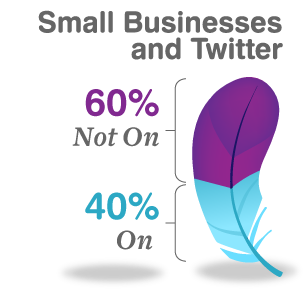Content Means Business. But it Takes Collaboration not Automation.
 Looking to develop new leads for your business? Wondering why new visits to your website are declining even though you use Twitter and have a Facebook profile or fanpage? Are you blogging? According to the State of Small Business Report from Network Solutions in conjunction with the University of Maryland School of Business (with a tip-of-the-hat to HubSpot for featuring data from the report on their blog), fewer than 40% of U.S. small businesses blog about their area of expertise. Let’s rephrase that: nearly 60% of small businesses are leaving their content on the table. And by “on the table,” I mean nowhere to be found. So why do you care? Because there is mounting evidence that blogs are not highly trafficked by loyal readers, but rather by new visitors via referral links and search engines. And new visitors equal potential new business.
Looking to develop new leads for your business? Wondering why new visits to your website are declining even though you use Twitter and have a Facebook profile or fanpage? Are you blogging? According to the State of Small Business Report from Network Solutions in conjunction with the University of Maryland School of Business (with a tip-of-the-hat to HubSpot for featuring data from the report on their blog), fewer than 40% of U.S. small businesses blog about their area of expertise. Let’s rephrase that: nearly 60% of small businesses are leaving their content on the table. And by “on the table,” I mean nowhere to be found. So why do you care? Because there is mounting evidence that blogs are not highly trafficked by loyal readers, but rather by new visitors via referral links and search engines. And new visitors equal potential new business.
Now you might be wondering how large corporations fare… not much better. According to research published by UMASS Dartmouth, a paltry 108 of the Fortune 500 have consumer-facing blogs, and oh – by the way, nearly 40% of those come out of the top 100. Another eye-opening report, also from UMASS Dartmouth, the Social Media in the 2009 Inc. 500 features another killer statistic: when asked if their company blogs to communicate with existing or potential customers, only 13% of companies responded yes.
So once we get past ignoring the value a blog can have on how your business is found (and by value, I mean real costs), we can get to why you are feeling down about the low level of engagement your social participation is generating. Lee Odden said it best recently: “Showing up to the game doesn’t mean there will be an audience.” The platforms are free (for now anyway), but you need to invest dollars behind the human energy that will make your social marketing channels deliver results. There is no “easy-button,” and I remain unsure as to why that disconnect ever manifested. Similar walls have been hit in the world of search marketing, where powerful tools seemingly promise to generate new levels of automated efficiency on data crunching. But the reality is (as discussed in the previous link), even as technology generates certain efficiency, it needs to be managed and done so properly. And I think we know who manages technology… we tend to call them people.
Between blogs and the social networks relevant to your customers, we are effectively heading toward constant contact – contact that is fed by real-time, in-the-moment content and well-developed, strategically planned content. The latter being the content that is increasingly given high-value by the individuals who refer/share it as well as the search engines that rank credible information. I realize that assertion sounds self-indulgent for someone in marketing, since I believe businesses need what we sell to create and manage content… but I am not the only one who thinks so (not by a long shot). One of my favorite quotes on content and brands is from Adam Singer: “If your brand isn’t publishing content to the web and involved in building a thriving community of subscribers, you will forever be positioned behind competitors agile enough to do so.”
In the old world of marketing, we would set up a few meetings with our clients. Perhaps bi-monthly, quarterly or weekly if we could really pin things down. But this won’t keep the social train rolling. It won’t keep clients adequately plugged into the feedback loop that is developing from customers. And it won’t spur real-time creativity. The new model means real low walls or better yet, none at all. I can’t imagine how often a great idea might get buried or overlooked by who is either not on the email or the meeting agenda. Perhaps more significantly, collaboration about social media content will very likely improve your other marketing initiatives.
Now if you think about Adam’s quote and the statistics on blogging as well as the Compendium survey for a moment, ask yourself this: can you afford to let your competition beat you to the content chase?




